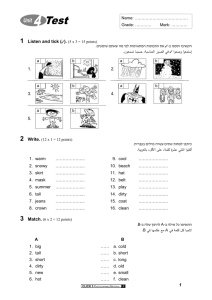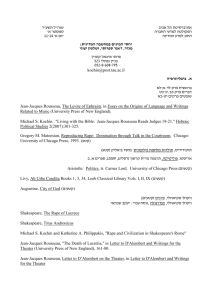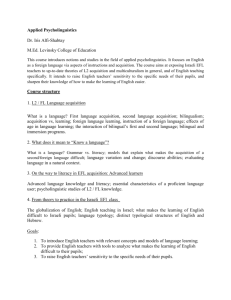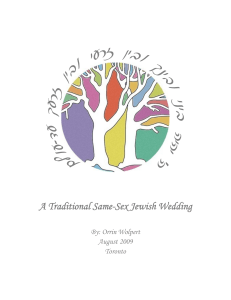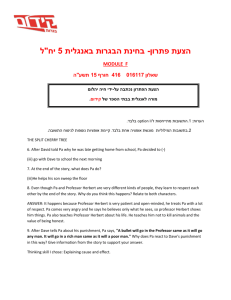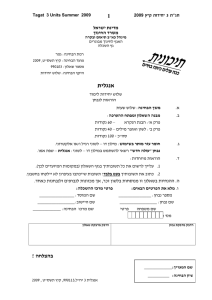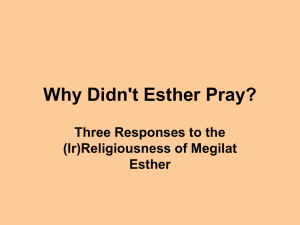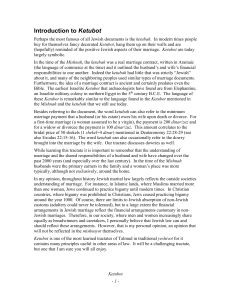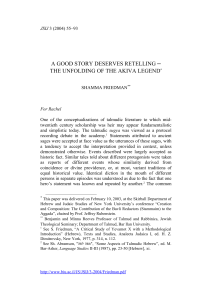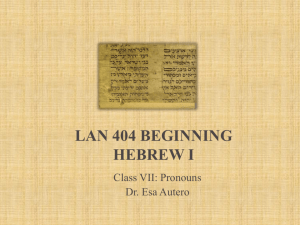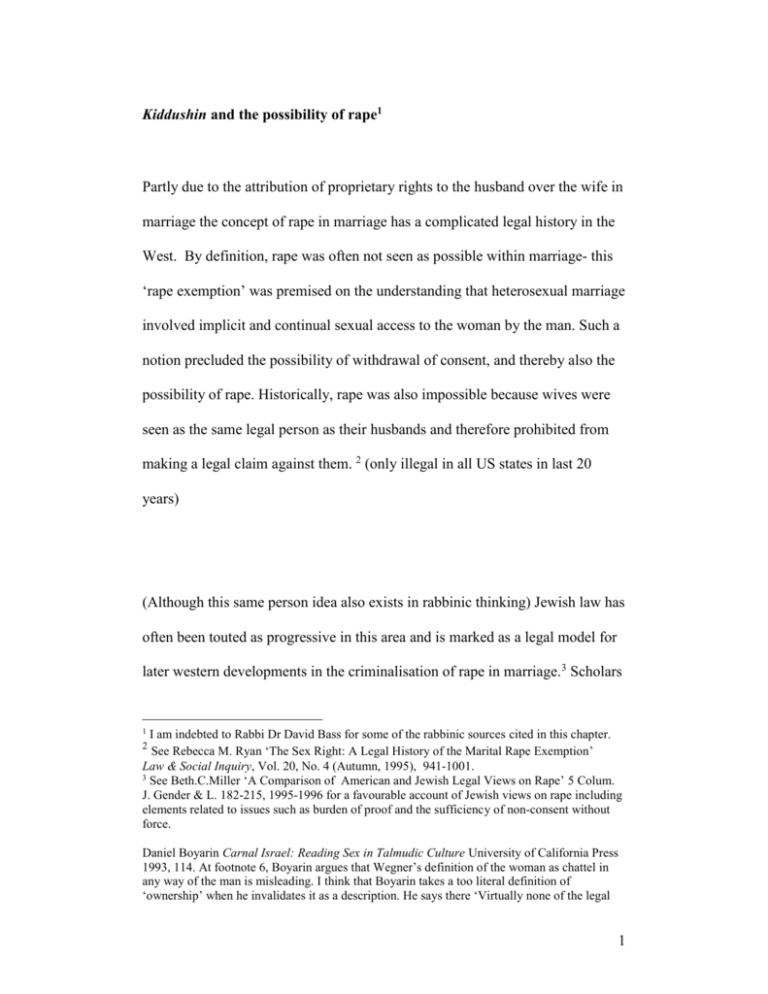
Kiddushin and the possibility of rape1
Partly due to the attribution of proprietary rights to the husband over the wife in
marriage the concept of rape in marriage has a complicated legal history in the
West. By definition, rape was often not seen as possible within marriage- this
‘rape exemption’ was premised on the understanding that heterosexual marriage
involved implicit and continual sexual access to the woman by the man. Such a
notion precluded the possibility of withdrawal of consent, and thereby also the
possibility of rape. Historically, rape was also impossible because wives were
seen as the same legal person as their husbands and therefore prohibited from
making a legal claim against them. 2 (only illegal in all US states in last 20
years)
(Although this same person idea also exists in rabbinic thinking) Jewish law has
often been touted as progressive in this area and is marked as a legal model for
later western developments in the criminalisation of rape in marriage.3 Scholars
1
I am indebted to Rabbi Dr David Bass for some of the rabbinic sources cited in this chapter.
See Rebecca M. Ryan ‘The Sex Right: A Legal History of the Marital Rape Exemption’
Law & Social Inquiry, Vol. 20, No. 4 (Autumn, 1995), 941-1001.
3
See Beth.C.Miller ‘A Comparison of American and Jewish Legal Views on Rape’ 5 Colum.
J. Gender & L. 182-215, 1995-1996 for a favourable account of Jewish views on rape including
elements related to issues such as burden of proof and the sufficiency of non-consent without
force.
2
Daniel Boyarin Carnal Israel: Reading Sex in Talmudic Culture University of California Press
1993, 114. At footnote 6, Boyarin argues that Wegner’s definition of the woman as chattel in
any way of the man is misleading. I think that Boyarin takes a too literal definition of
‘ownership’ when he invalidates it as a description. He says there ‘Virtually none of the legal
1
have argued that ‘implied consent for sexual intercourse is alien in Jewish law’4
and that the law commands the parties to engage in sex only of their own
volition.5 However despite this widespread perception, the non-reciprocal
establishment and dissolution of the rabbinic marriage, and some rabbinic
understandings of the marriage relationship, may not be as wholly progressive
and supportive of women’s rights as suggested.
Rabbinic Marriage and Sex Rights
Despite the prevalent view that rabbinic law does not condone rape in marriage,
a minority of later rabbinic commentaries define the acquisition inherent in the
betrothal of Jewish marriage (kiddushin) as synonymous with acquisition of the
sex right. To be sure, not all commentators condone rape in marriage, but the
non-reciprocal nature of marriage makes it vulnerable to such interpretations,
even if not widely accepted. Even if we were to cast aside those minority
commentators who explicitly condone rape in marriage (which I don’t think we
should), these minority cases cast a shadow on all marriages following this
model. Even if rape has not occurred or been condoned in the majority of
definitions of ownership apply. A husband may not make use of her sexuality without her
consent; he may not alienate it; he may not dispose of it.’ It is fair enough that the usual
categories of ownership that would apply to a cow or land do not apply. But contrary to
metaphorical representations, she is neither cow nor land. Her inability to be divorced on will
and the non-reciprocity that it represents is synonymous with an acquisitional paradigm. In the
same footnote, Boyarin refers to the fact that an American court cited the Talmud as a legal
precedent for treating wife-rape as rape. I think it is most apt that he says ‘I remember reading
somewhere (but unfortunately not where)..’.
Miller, ‘Views on Rape’, 208.
Ibid.
See also Mordechai Frishtik, ‘Physical and Sexual Violence by Husbands As a Reason For
Imposing a Divorce In Jewish Law’, 9 The Jewish Law Annual 163 (1991).
4
5
2
Jewish marriages, the fact that the model of partnership could give rise to
interpretations that permit rape in marriage is extremely troubling.
The question of a male sex right implicit in marriage (barring times of niddahprohibited menstruation and birth related times) is important in analysing
Jewish marriage as a relationship where the man acquires the woman.
In the traditional Jewish context, the boundary of the husband’s proprietary
rights over the women is further layered and complicated through the
rabbinically construed right of the woman to receive sexual pleasure from her
husband, a right interpreted by the rabbis on the basis of the biblical verse,
Exodus 21:10.6 Although subject to possible alternate understandings, this right
to sexual pleasure is interpreted as one of the three biblical obligations
incumbent on a husband, alongside food and clothing.7 Modern scholars use
the man’s obligation to give his wife sexual pleasure as a foil against claims of
the male sex right in marriage. For example, one scholar argues that sexual
intercourse is ‘the duty of the husband and the privilege of the wife’.8
Marital Rape in the Talmud
6
Ibid.
7
Exodus 21:10
See Shalom M. Paul ‘Exod. 21:10 a Threefold Maintenance Clause’
Journal of Near Eastern Studies, Vol. 28, No. 1 (Jan., 1969), 48-53;
8
Rabbi David Feldman quoted in Susan Weidman Schneider, Jewish and Female, 199 (1984).
3
One of the main rabbinic statements against rape in marriage is the following
statement from the Babylonian Talmud, Tractate Eruvin 100b:
Rami Bar Hama said that Rav Asi said: It is forbidden for a man to force
his wife in a holy deed, for it says, One who hurries the legs is a sinner
[Prov.19:2]. And Rabbi Yehoshua ben Levi said: One who forces his
wife in a holy deed will have dishonest children.9
Daniel Boyarin argues that the opinion that one may not force one’s wife is not
a minority opinion. According to Boyarin, the view that opposes rape in
marriage is:
the generally held and authoritative position both of the Talmud and of
later Jewish law. Indeed, far from treating a wife as a piece of property,
or mere object for the satisfaction of the husband’s sexual desire,
Talmudic law may be the first moral or legal system to realise that when
a husband forces his wife the act is rape, pure and simple, and as
condemnable and contemptible as any other rape.10
However, the sources are not all as unequivocal about rape being forbidden in
marriage. The language in this illustrative text that purportedly condemns rape
is more of a moral exhortation than a straightforward legal prohibition. (this
point is dependent on reading R. Yehoshua Ben Levi as providing an alternative
position rather than elaborating on Rav Asi’s position). In that reading, the
stipulated consequence of having ‘dishonest children’ is a moral
discouragement rather than the punishment expected for a transgression of such
nature.
9
10
ואמר רמי בר חמא אמר רב אסי אסור לאדם שיכוף אשתו לדבר מצוה שנאמר ואץ ברגלים חוטא וא"ר יהושע בן
לוי כל הכופה אשתו לדבר מצוה הויין לו בנים שאינן מהוגנין
Boyarin, Carnal Israel, 114.
4
Permissible Vows and the Contours of Marital Duties
Early rabbinic sources do not refer to the husband’s right of sexual relations
with his wife. The question arises however if lack of the right of the woman to
vow not to have sex is the same as the husband’s right to have sexual relations
with his wife. (In parenthesis, important to classify woman as sexually
autonomous and having sexual agency although that is not within the scope of
this paper.) For example, Tosefta Nedarim 7:1 could be taken to imply that
there is not an automatic assumption and right of sexuality for a man with his
wife. There the Tosefta delimits a list of his wife’s vows that he can and cannot
overturn. (The overturning of one’s vows by one’s husband is another instance
of the acquisitional nature of the marriage relationship). In tNedarim 7:2 is a
selection of vows that he does not even need to overturn because they simply
do not hold, thus is the power of the acquisition and subsequent marriage. As it
says:
If she says ‘I will not serve you, and I will not wipe your feet and I will
not pour your glass, he does not even need to overturn it, she is forced
against her will.11
The capacity of the husband to overturn a vow of his wife is evidence of the
power of the husband’s acquisition of the wife. 12 This power is even more
שלא אציע לך [מפה] ושלא אדיח לך רגליך ושלא אמזוג לך את הכוס אין צריך להפר [כופה] אותה על כרחה רבן
גמליאל אומר יפר משום שנאמר (במדבר ל) לא יחל דברו
12
The husband can overturn the vows of his wife in all matters except for those that do not
involve deprivation and are between her and other people (as opposed to her and him), Judith
11
5
evident in absentia, in the case of the woman cited above who vows not to serve
her husband. He does not even need to overturn her vow because it has no
validity from the beginning. Her words cannot exist to the extent that she or
they will in any way undermine the acquisition and possession of the wife by
the husband, and the power relations that the subject of these vows promotes.13
Since the Tosefta does not include sexual relations in this category of unviable
vows, but rather explicitly includes the vow of the woman not to have sex with
her husband as a vow the husband can overturn, perhaps we can assume that the
Tosefta does not include sexual intercourse as an assumed right of the husband
through marriage. The husband must make an affirmative statement to annul
the wife’s vow and thus his right to sex with her does not appear sufficient to
override her agency in making the vow. (Similar conclusion from mNedarim
1:12)
The Talmud (Nedarim 81b) limits the situation where the husband would annul
the vow to a case where the woman would vow that she would not get pleasure
from sexual intercourse− on the grounds of the Talmud statement at Nedarim
81b that ‘noone can be fed what is forbidden to him−’
מאכילין שאין
Romney-Wegner Chattel or Person: The Status of Women in the Mishnah Oxford University
Press 1988 , pp.54, 93, 104, 128.
13
The ineffectuality of her words stand in stark contrast to the power of his words as argued in
Chapter 2 of this dissertation with the support of speech act theory and the performance of
actions through words exercised by the acquiring man. See Romney Wegner, Chattel or
Person? , 54-59 . Interestingly, Hauptman, Rereading the Rabbis, includes nothing about vows.
6
לו האסור דבר םהאד אתso therefore if she had vowed
against her own pleasure he would be simultaneously preventing himself from
having sexual relations with her (with the assumption that it would give her
pleasure). However the Talmud ( possibly in opposition to the Tosefta) states,
depending on how she worded her vow, that if she was forbidding her husband
from sex with her then it would not even stand as a valid vow. This is because it
goes against the basis of the marriage relationship and the acquisition it implies.
What, if any, is the meaning of the women’s inability to make a vow not to
have sexual relations with her husband?
What is the measure of consent required?
The following source from Babylonian Talmud, Tractate Niddah 12a does not
sanction rape outright but it does raise serious questions about whether the
rabbis require the married women to consent to sexual intercourse;
The rabbis teach: Donkey drivers and workers and those who come
from a mourning house and from a house of celebration- their women
have a presumption of ritual purity. And they can come and be with
them whether they are awake or asleep. What does this refer to? If he
left them in a state of ritual purity, but if he left them in a state of ritual
impurity then she is ritually impure until she says ‘I am ritually pure’.14
14
ת"ר חמרין ופועלין והבאין מבית האבל ומבית המשתה נשיהם להם בחזקת טהרה ובאין ושוהין עמהם בין ישנות
בין ערות בד"א שהניחן בחזקת טהרה אבל הניחן בחזקת טומאה לעולם היא טמאה עד שתאמר לו טהורה אני
7
In this source we see that women’s ostensible personal consent is superseded by
the category of her ritual purity and impurity. If he knows that she was ritually
impure when he left then a husband assumes his wife is also in this state when
he arrives home and that he can have sexual intercourse with her even while she
is sleeping. She does not need to consent but she does need to have been
ritually pure, at least when he left her.
The Tosafists at Niddah 12a need to reconcile that text there (as quoted above)
which seems to allow the man to have sex with his wife if she is asleep as long
as he left her in a state of ritual purity, with the prohibition for having sexual
intercourse with a sleeping woman in Nedarim 20b.15 The Tosafists write:
‘Including sleeping’- meaning, that they are not subject to the
prohibition of the menstruant. But it is forbidden to have sexual
intercourse with a sleeping woman as it says in Nedarim. Or else here it
refers to her when she is not completely sleeping, but rather she is not
awake enough to be able to respond if she is ritually pure or not.16
In reconciling these two seemingly inconsistent texts, one that says that a man
can have sexual intercourse with a woman if she is sleeping as long as he
knows she is ritually pure, and the other which says that sexual intercourse with
15
At Nedarim 20b there is the statement that a man can do what he likes with his wife and it is
followed by analogizing her to a piece of meat. Just as a piece of meat from the butcher can be
eaten salted, or roasted or baked according to one’s desires so too can a woman be consumed
according to one’s desires. See Gail Labowitz, ‘Is Rav’s Wife “a Dish”? Food and Eating
metaphors in Rabbinic Discourse of Sexuality and Gender Relations’ in Studies in Jewish
Civilization 18: Love—Ideal and Real—in the Jewish Tradition Creighton University Press,
2008, 147-169 at 153.
בין ישנות פי' דליכא איסור נדות אבל אסור לבא על הישנה כדאמר בנדרים א"נ הכא לא לגמרי בישנהאיירי אלא אינה ערה כל כך שתדע להשיב אם היא טהורה אם לאו
8
a sleeping woman is forbidden, Tosafot have created a new category of semisleeping. This new category refers to the woman who is apparently too asleep
to respond about her ritual status, but not asleep enough for the prohibition of
sexual intercourse with a sleeping woman to be applied to the man.
17
Even those who do recognise rape in marriage and disallow it, often couch their
objections in terms of holiness and the vertical relationship with God, as
opposed to ethics and the horizontal relationship of mutuality between the man
and his wife. In this context, it is a problematic reflection of the marriage
relationship that a breach of the woman’s bodily integrity and of general human
decency is not actually considered to be a breach of the marriage relationship.18
Due to time restrictions in this paper I left out the sources from Rambam and
the Ran that are expressed in the moral tone. (Hilkhot Issurei Biah 21:11,12)
More troubling is the few halakhists who recognise the right of the husband to
force sex upon his wife physically as part of kinyan kiddushin.
17
See Ephraim Kanafogel ‘Progress and tradition in Medieval Ashkenaz’ Jewish History 14: 287–
315, 2000.
See Ilmi Idrus and Linda Rae Bennett, ‘Presumed Consent : Marital Violence in Bagus
Society’ in Violence Against Women in Asian Societies (eds Linda Rae Bennett and Lenore
Manderson) New York: Routledge 2003, pp41- xx at 46. They argue that the legal construction
of the crime of rape makes it an ethical crime (more between human and God) as opposed to a
crime against an individual (a crime against the woman who has been breached). This same
question is also reflected in how rape can possibly be understood in Islamic law as part of the
law of Hiraba (violent-taking) and Jirah (bodily harm) as well as being seen within the laws of
Hudood and more particularly, Zina ,which pertains more to illicit sexual relations and
questions of shame and honour more generally. For more details on this see Asifa Quraishi ‘Her
Honor: An Islamic Critique of The Rape Laws of Pakistan from a Woman-Sensitive Position’
18 Michigan Journal of International Law 1996-7, pp.287-320.
18
9
The Ran, for example, in a commentary on BT Nedarim 20b argues that when
‘it is written; “when a man takes a woman”, (ki yikach ish haisha) she is taken
for him to do with her all he desires.’ Evidently this biblical verse, “when a man
takes a woman”19 one of the few biblical verses about marriage, is used to
bolster the later rabbinic notions of the acquisition in marriage. (explain context)
In a similar vein, the Shita Mekubetzet (on Nedarim 15- 16th century
compilation) says:
If a woman says to her husband ‘my sexual intercourse is forbidden to
you’- we force her and he has intercourse with her because her
obligation cannot be abrogated since she is acquired to him for his
intercourse as it is written; ‘when a man takes a woman’. 20
Here, the Ran and the Shita Mekubetzet employ the biblical language of kicha
(taking) as a way of describing the acquisitional nature of marriage. In their
appropriation of kicha, the original ‘taking’ in the biblical text stands in as a
marriage motif for continual and ongoing− possibly forceful− taking of the
woman by the man.21
19
Deut 24:1
20
האומר לבעלה תשמישי יאסר עליך כופין אותה ומשמשתו דלא מצי פקע שעבודה שהיא קנויה לו
לתשמישו כדכתיב כי יקח איש אשה
21
This is an example of the rabbis reading their own developments in kiddushin back in to the
Bible.
10
The Netziv, although a later posek (19th century), takes this concept even
further, displaying a broadly encompassing understanding of the acquisition
inherent in traditional marriage. He says (Meshiv Davar 4:35);
And the acquisition of the wife by the husband is in matters of personal
status, and it is not like what the Rambam said about the prohibition to
penetrate an available woman…if he rapes her God forbid he has to pay
shame and hurt expenses and he is like a thief..this is not so with his
wife who is acquired to him and she is obligated to give him at every
moment that he desires and she does not do so willingly then he can
force her like a master forces his maidservant to do his work and all
these things are clear and it is not necessary to reflect more about it..’22
Although the Netziv is a 19th century posek, his opinion is instructive as an
extension of some of the other views emerging from the medieval
commentators with their roots in the rabbinic material. It shows the ultimate
logic and danger of acquisition that reaches beyond the potential tragic
consequences of women being stranded as by recalcitrant husbands. In this
dangerous power dynamic of acquisitional marriage, the couple would have to
work against the grain to establish mutual trusting partnerships and break the
model of an unequal master-slave- like dynamic.
Two years ago at the JLA conference in Manchester, many scholars approached
me taking issue with me calling marriage acquisition. However, I am still
arguing that the acquisition involved in rabbinic marriage should not be
downplayed. The fact that a woman cannot be onsold does not undermine the
אפילו לדעת, הוא מועיל לא מבעיא לדעת הרמב"ם שאסור לבעול פנויה,וקנין אשה לאיש בעניני אישות
והרי, אבל אינה מחויבת להזקק לו ואם הוא מאנסה ח"ו חייב לשלם בושת ופגם,החולקים אינו אלא רשות
משא"כ אשה שהיא קנויה לו היא מחויבת להזקק בכל עת,הוא כגזלן וכאשר יקום איש על רעהו והכהו
שירצה ואם אינה מזדקקת לו ברצון יכול לכופה כמו שהאדון כופה שפחתו לעשות מלאכתו וכ"ז הם דברים
ברורים ואין כדאי להפוך עוד בזה
22
11
above analysis that shows how some scholars interpret marriage to include nonnecessity of consensual sexual intercourse.23 Even though there are poskim who
overtly prohibit rape in marriage, this does not undermine my argument that
draws the connection between more encompassing views of acquisition in
marriage and possible leniencies about rape in marriage. This connection
demonstrates the inappropriate nature of acquisition in general, as a basis for
marriage. The unsuitability of this model of relationship problem is more
pronounced if marriage is to function as the foundation of the kind of mutual
relationship that many heterosexual Jews increasingly want to create in the
twenty-first century and beyond.
_____________________
23
Using the fact that a woman cannot be onsold as proof of her not being acquired is not the
only way to interpret this limitation. I think that the perspective that the husband cannot
surrender his exclusive sexual rights to his wife by passing her on to someone else is more
correct. The husband’s acquisition is subject to limitations of halakha such as adultery and ritual
purity taboos.
12
13

